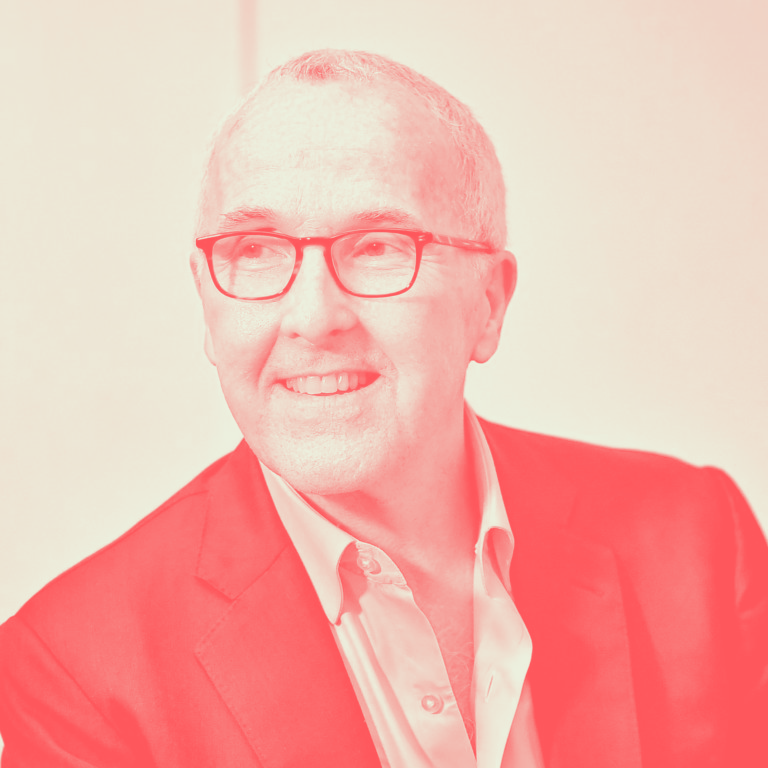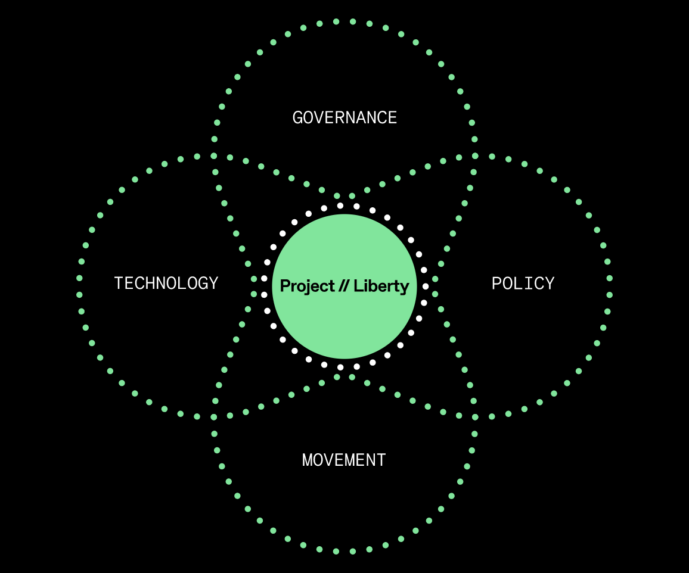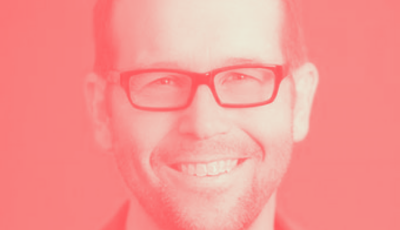News 10 January 2023
Actors’ views: Frank McCourt

Project Liberty presents itself as “a visionary initiative to transform how the Internet works, who owns and controls personal data, and who benefits from the digital economy.” Can you tell us more about this initiative?
Project Liberty is focused on taking advantage of the evolution of technology to fix the technology and give users back control over their data. We take advantage of the current move from Web2 to Web3 to innovate, to reinvent and to redesign how the technology works. Project Liberty is not a tech project, it’s a project about democracy, about a more hopeful future. It has a very powerful “Tech” track, which is focused on developing a protocol – the Decentralized Social Networking Protocol (DSNP) –, but also a “Governance”, a “Movement” and a “Policy” track. You can see it like a Venn diagram with “Technology”, “Governance”, “Movement” and “Policy” as the four circles, with Project Liberty at the intersection in the middle.

The four "tracks" of Project Liberty
Europe has worked hard to set up a regulatory framework and policy objectives in the field of digital technologies and uses. Now, you need to get big tech companies to comply with it. Project Liberty’s approach is fundamentally different. Although we admire the work that European regulators are doing, we don’t believe that regulation alone is the answer. These companies are too big, too powerful, they move too fast. We think it is a losing battle to beg big tech to comply with and meet these objectives. We should innovate with those objectives in mind, and design the technology to optimise it for healthy democracies.
We want to give people a choice: right now, our data is stripped from us and is used by tech companies. We grant permission for that when we accept the terms and conditions of those companies, but nobody I know reads those. In the end, we don’t know what they are doing with our data. Over the last few years, we have also seen that the data can be used in permissionless ways. The goal of Project Liberty is to give people back control over their data, so they can decide what to do with it. When we have control, we may make bad choices, but at least it is not someone else’s bad choices.
Moreover, rather than just a few platforms benefiting from this data, imagine if some of that benefit was shared with the users themselves. They could be compensated and we could have a much healthier and fairer economic model.
To sum it up, we have a tech structure that I believe is fundamentally flawed and will never be satisfactorily regulated. We need to fix the technology and that’s what Project Liberty is intended to do: transform the way the Internet works, give back ownership and control to people so that they can decide what to do with their data. We have new possibilities in this regard now, thanks to the new generation of technology, Web3.
What has motivated you to launch this project, and why launch it now?
It is quite personal and relates to my upbringing. I was raised in a way that encouraged me not only to identify problems, but above all to find solutions to solve them. I am also from a family of builders (literally), and Project Liberty is all about that: innovating, building, doing something about the problem, not just complaining about it.
Then, I don’t want to live in an autocracy and yet, we have designed our technology as autocratic. The current tech design where everyone is surveilled all the time, where our data is scooped up in a central place and where a few individuals decide what to do with it, doesn’t sound like democracy to me. We are seeing this play out: Twitter is now run by one individual who gets to decide what the governance looks like and how the data will be used. We are offering to take back one of the most important rights that we have in a digital society, which is our data.
Society is acting like a deer caught in a car’s headlights. We have been frozen thinking that technology has to work the way it works now. We are trying to pass regulations in order to mitigate the damage instead of waking up acknowledging that we can have other protocols to redesign how the technology works for the benefit of democracy and individual rights. We should not look at technology as a big powerful construct that we have no power or control over.
I thus spoke to Braxton Woodham about taking advantage of new emerging technologies, and creating a protocol which would allow for the creation of a decentralised universal social graph. That’s how the DSNP project started. Web2 is an ‘Internet of Data’. Web3 is going to bring about an ‘Internet of Data and Value’. People will have wallets, they will be able to set terms through smart contracts, and so forth. I think it unleashes massive potential for society and individuals in a way that could be incredible, but not unless we redesign how the tech works.
Why did you choose to establish the McCourt Institute, which focuses on the “Governance” track of the project, in Europe, and why specifically at Sciences Po?
One of the four tracks of Project Liberty is indeed about governance. We can’t just let technologists alone design our future. So we wanted to put together expert social scientists and expert computer scientists. The McCourt Institute is about that: bringing social science expertise on the matter. We deliberately picked two non-engineering schools renowned for their work in the social science field and which are focused on the common good, to strongly signal that social scientists needed to be involved. We chose Georgetown University (Washington DC) and Sciences Po Paris as founding partners, because we wanted to make sure we had initially a representative from the United States and a representative from Europe. However, we are now inviting others to join, and others will be joining. Project Liberty is not about creating some exclusive club. It is about opening the doors to engage people who care deeply about the future and want to see the world operate better. Besides, engaging experts widely recognised in the social sciences field was a very important validation point of the project. It allowed us to shape and refine it, to make it stronger and to increase our chances of success. It creates momentum and we will soon announce other partners.
Twitter was recently bought by Elon Musk, who has stated “freeing the bird” as his ambition. This shift has reignited people’s interest in decentralised social networks. How do you position Project Liberty in this context?
Things are accelerating very quickly, and we are looking to bring in major partners for each of our four tracks of work. Project Liberty is not about doing something somebody else is already doing. Instead, our state of mind is “let’s find out who is doing it well and invite them into the project”. Project Liberty is like a connective tissue, a collaborative environment. It follows a team approach: the more people we have pulling in the same direction, the more quickly we are going to move and to change things.
Our next steps would be to build out the organisation (we recently brought in a CEO for the project) and to continue to invite in like-minded organisations that are interested in one or some of the four tracks and that can bring real value. This sounds simple because it is, but it’s also difficult to achieve. Then we need to get the DSNP out in the world and start building use cases. We announced social network MeWe as our first implementation partner, and now 20 million users are migrating to the DSNP. Imagine a billion users from all over the world migrating to the DSNP over the next few years. Again, it is not a billion users to a single app, it is a billion users to a decentralised ecosystem.
A key feature will be data portability. Now, big platforms say that you can leave but you can’t take your data with you. Imagine a world where you could be on any app and use your data. These new apps could also be interoperable: you could be on app A and I could be on app B, and we could talk.
As regards business models, today, if you build an app, you can’t compete with platforms that have billions of users. Instead, you are going to hope that these big companies buy yours. This is the business plan. Let’s imagine, if storage is decentralised – which is also safer and less hackable –, everyone could benefit from the network effects of the data by building an app on top of this universal social graph. The DSNP will be joined with other protocols that will affect things like storage and so forth. All of them will create a new architecture. All kinds of apps will be built, some more successful than others. Great value will be created but it will be shared between the users and the creators of these new use cases. It will be more equitable.
Project Liberty aims to create what you call a “Movement”, as part of your four tracks. How does it intend to do so?
Movements happen when people get interested in something, when young men and women in colleges and universities start focusing on issues. When I was in college, it was the Vietnam War. Students got involved, organised themselves and connected with other people. Suddenly, a movement was created and affected public opinion as well as political decisions. We need to fuel a movement, give people a project to get excited about, and let civil society get involved. Project Liberty is a connector. We are interested in helping actors and experts accelerate and amplify their work. The best way to do that is to connect people with other like-minded people.
60 organisations joined Unfinished and the network is still growing. Today, these impact-driven organisations are affected by the functioning of social networks too. Their own data is also being used. Wouldn’t it be better if they could use values-aligned technology? Organisations want to get focused on the technology and get engaged. What we offer is a project. We don’t ask people to sign up for the rest of their lives or careers. We ask them to do their best work and put energy into solving these problems. It is the beginning of a space of exploration.
Have you seen any reaction at all from big tech companies in relation to Project Liberty and what it advocates for? Are you working with them on solutions to create new models and more ethical uses of their platforms?
Last December, Jack Dorsey tweeted ‘Twitter is funding a small independent team of up to five open source architects, engineers, and designers to develop an open and decentralized standard for social media. The goal is for Twitter to ultimately be a client of this standard.” Sounds a lot like the DSNP, doesn’t it ? When Elon Musk announced he was buying Twitter, I sent him and all the board members of Twitter a letter. I said that if they were serious about democracy and this project, we had a protocol already built, ready to be released. I said that we would be happy to help and work together. I didn’t hear anything back until a week before the deal closed. I sent the letter again, as they requested, and I have never heard back from them since.
Besides that, we do not have interactions with Big Tech, nor do I necessarily expect to, because we are building a different architecture than theirs. I am not sure that Big Tech is going to change unless there is a general move. This is why the “Movement” track of Project Liberty is so fundamentally important. Otherwise, there is no incentive for big tech to change. I have seen a lot of things that I thought should change in the world, that haven’t necessarily changed until people got involved and forced the change. This one is challenging, because we deal with big companies that have a huge head start. But I have a tremendous amount of faith in young people. I think college campuses and universities are great places for us to be interacting. It is very important to get civil society involved, because big tech will have to respond. This is why Project Liberty needs to be much more than just a tech project.
You recently said that legislation could help change the “rules of the game” and force social networks to give up control of users’ personal data. Is Project Liberty working with public authorities in this regard?
There used to be only three, but there are now four tracks within Project Liberty. We have added a fourth track, the “Policy” one, specifically for this purpose. We need to be more engaged with policy makers, regulators and elected officials. Until now, we have done a decent job of informing people about what we are doing. For instance, in Europe, I have met with Thierry Breton, because I see that what we are doing is totally consistent with the policy objectives that he has worked so hard to turn into legislation. I met with several others in Europe and likewise in the United States. However, Project Liberty is not a regulatory project. We support and admire this work, but our project is about innovation. I think that, ultimately, innovation will be more powerful as a solution here.
Also, there are two types of regulation: one which is about constraint and limitation (e.g. antitrust) and one which is about removing friction (e.g. levelling a playing field, making it more fair so innovation can flourish and thrive, etc.). I think it is important that the regulatory policy making world understands that innovations like Project Liberty exist, and that it might help them to achieve their policy objectives. We want them to be aware of that, and we certainly don’t want to see bad regulations passed inadvertently.
Big Tech is probably not super excited about what is happening with Web3 and the idea of individuals owning and controlling their data. Right now, blockchain technology does not have a great reputation. Web3 is more than blockchain, but blockchain is a piece of it. It is not hard for me to believe that Big Tech companies could lobby for regulation to be passed with the official objective to protect people from certain blockchain uses. However, these regulations could undermine innovation and maintain the status quo. This is why we need to get more actively engaged in communicating with policy makers.
Are there any other remarks you wish to share with us ?
Project Liberty is a project for democracy. Once we can fix the technology, imagine all the benefits of having technology work for democracy, for society and for people, as opposed to against it. There is no space between us: I am where you are, you are where I am. We have to get together as people, and decide that this is a big enough problem we want to fix. If we put enough time and energy into it, we can achieve it and I invite anyone who is interested to join the project.
-

Publication 3 July 2020
Moderating our (dis)content: renewing the regulatory approach


